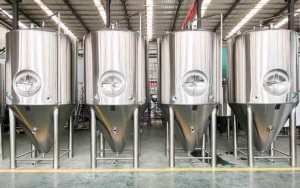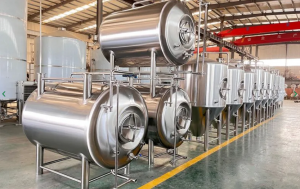
Brewing beer at home has surged in popularity over the years, with enthusiasts embracing the craft of creating unique and flavorful brews right in their own kitchens. However, embarking on this journey requires the right tools and equipment to ensure success. Whether you’re a novice or seasoned homebrewer, understanding the essential equipment needed to start brewing beer is crucial. In this guide, we’ll explore the must-have equipment to kickstart your brewing endeavors.
Brewing Vessel:
At the heart of every homebrew operation is the brewing vessel. This can range from a simple stovetop pot to specialized brewing kettles. A 5-gallon stainless steel kettle is a popular choice for beginners, offering ample space for brewing small to medium-sized batches. Look for a vessel with a built-in thermometer and volume markings for precision brewing.
Fermenter:
After the brewing process, your beer needs a place to ferment and develop its flavor. Plastic buckets or glass carboys are common choices for fermenters. Ensure that whatever vessel you choose has an airtight seal and is large enough to accommodate your batch size. Many fermenters come with airlocks to allow carbon dioxide to escape while preventing contaminants from entering.
Airlock and Stopper:
An airlock is a crucial piece of equipment that allows gases to escape during fermentation while preventing oxygen and other contaminants from entering the fermenter. Paired with a stopper, it creates a sealed environment for your beer to ferment undisturbed. Choose a style of airlock that fits your fermenter and is easy to clean and sanitize.
Hydrometer:
A hydrometer is a tool used to measure the specific gravity of your beer at various stages of the brewing process. By tracking specific gravity readings before and after fermentation, brewers can calculate the alcohol content and monitor fermentation progress. This invaluable tool helps ensure consistency and quality in your brews.
Thermometer:
Temperature control is critical in brewing to achieve the desired flavors and prevent off-flavors caused by yeast stress or bacterial contamination. A reliable thermometer allows you to monitor mash temperatures, boiling points, and fermentation conditions accurately. Digital thermometers with quick response times are ideal for precise temperature management.
Brewing Ingredients:
Of course, brewing beer requires more than just equipment; you’ll also need high-quality ingredients. This includes malted barley or malt extract for fermentable sugars, hops for bitterness and aroma, yeast for fermentation, and water. Depending on your recipe, you may also incorporate specialty grains, adjuncts, and flavorings to customize your brew.
Cleaning and Sanitizing Supplies:
Maintaining cleanliness and sanitation throughout the brewing process is paramount to avoid contamination and off-flavors in your beer. Invest in brewing-specific cleaners and sanitizers to ensure that all equipment, including fermenters, hoses, and utensils, are thoroughly sanitized before and after each use.
Bottles, Caps, and Capper:
Once your beer has completed fermentation and conditioning, it’s time to bottle it for carbonation and storage. Collect and clean enough bottles for your batch size, ensuring they are free of any residual dirt or labels. Crown caps and a handheld capper are essential for sealing the bottles securely, preserving carbonation and freshness.
Conclusion:
Starting your brewing journey requires more than just enthusiasm; it demands the right equipment and tools to bring your beer-making dreams to life. By investing in essential brewing equipment such as brewing vessels, fermenters, hydrometers, and thermometers, along with quality ingredients and sanitation supplies, you’ll set yourself up for success in crafting delicious homemade brews. So gather your gear, roll up your sleeves, and get ready to brew your first batch of beer from the comfort of your own home. Cheers to the exciting world of homebrewing!
Learn more:Micet group

